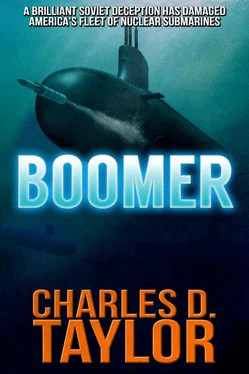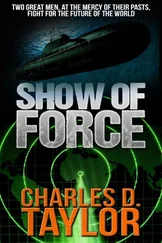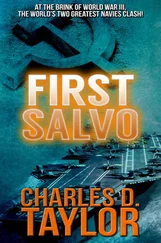Ray Larsen, always more silent by habit, was bothered when Robbie Newman maintained his customary long periods of silence. “You know you drive me crazy when you stare off into nothing like that.”
Newman had a thick shock of unruly gray hair and often was quite happy to listen to others, even though he gave the appearance of being asleep with his eyes open. Newman’s large, dark eyes slowly came around to the CNO. He said nothing.
“I used to think you were drunk years ago, Robbie. Now I know you’re thinking.” Larsen’s blue eyes flashed and he grinned at the others. “A penny for your thoughts,” he persisted.
“I’m imagining how ridiculously easy it might be to take out a boomer if you’re willing to do a little constructive thinking.” Newman’s eyes were fixed on a palm tree beyond the pool as he spoke. “You see, we’ve covered every angle so well from our own point of view that we’ve overlooked how the other guy thinks. I’ve been trying to put myself in his place and sink a couple of submarines.” He shrugged good-naturedly. “Is that worth a penny?”
“It’s worth a hell of a lot more if you come up with anything,” Larsen muttered. He rubbed a hand unconsciously through his crew cut, waiting expectantly to see what Newman had to say.
“Well, after considerable thought — which may have been all of twenty seconds — I decided that the only navy that really could take out our boomers would be Soviet. It doesn’t really make sense for anyone else. But, we can’t really track every single Russian submarine, can we?” Newman wasn’t expecting an answer, and continued, “The diesel boats stay in their own op areas close to home, so I can discount those. That leaves the nuclear fleet, and there’s no more than a hundred of those we have to worry about,” he mused, “if we figure how many are up for repair at any given time. So we try to keep track of them and spend our next couple of days putting everything and everyone we’ve got into figuring out where they are and which ones may be the bad guys.”
“You’re making it difficult,” Mark Bennett said. “That’s not really your point, is it?”
“No,” Newman answered. “But I’m not quite sure what my point is. I’m assuming since neither Alaska nor Nevada acknowledged that communications test, they’re lost. My considerable experience says it’s impossible for them to both be lost as a result of equipment casualties. My considerable experience also says that any Russian submarine that tried to come close enough for a shot at them would have blown his cover before he was anywhere within torpedo range. It’s our old standby theory about equipment casualties, raised yet again — once, maybe yes, but definitely not twice. The Soviet boats are still easier to hear than one of our own. Remember, our boomers stream the towed array for the specific purpose of avoiding any such surprises.” The towed array was a series of highly sophisticated listening devices implanted in a long rubber tube and towed well behind the Trident submarines to provide long-range warning of approaching danger. “I can’t imagine either Alaska or Nevada possibly remaining unaware of any — and I mean any — type of Soviet submarine approaching within firing range.”
Admiral Larsen stroked his chin thoughtfully with one hand. “That’s worth a lot more than a penny.” Newman had stated what they already agreed on — in his own terms. Glancing at Bennett, he asked, “How does that balance with your technical data?”
The Navy invested billions of dollars each year in an attempt to keep a reasonable accounting of Soviet submarine movements. Such intelligence would be invaluable in time of war. The initial step, and the least expensive method, involved spies who were supposed to report all ship movements. But that was only good until the ships were out of sight. Then there was an extensive underwater hydrophone network covering a large part of the ocean floor. It was linked to a computer system that attempted to follow each submarine’s track as long as a contact remained within range. Beyond that, ships specifically designed to tow deep-running passive listening devices relayed every sound they detected via satellite to shore-based computers which analyzed and filtered out everything but the submarine. And there were air, surface, and subsurface antisubmarine groups that attempted to chase any unknown contacts until they were identified. The effort was magnificent, but the end result was sometimes disheartening to the educated observer. There were too many holes in the ocean. And the odds could not be overlooked. Submarines grew increasingly stealthy and dangerous. Submariners became increasingly skillful and cunning. But Newman was right. No Soviet boat should be able to sneak within torpedo range. They all knew that.
Bennett smiled wanly. “There are probably thirty of their submarines I couldn’t even begin to locate. But we can tell you roughly how many may have been in or near those sectors in the past month, and I emphasize the ‘may have been.’ The tough part is that most of them are unlikely candidates to sneak up on any boomer.”
“Could the same one hit both Alaska and Nevada?”
“You asked that before.” Bennett was amazed how he and three other grown men could play word games like this, hoping that a new idea might suddenly be generated from the tired ones they kept repeating.
“You didn’t have all the data you have now, Mark.”
“It would have had to travel flank speed from Alaska’ s sector to nail Nevada. Russian boats are faster than ours. The ones that could have covered that distance make a lot of noise. I don’t know of any in that region of the Pacific.”
“How about SURTASS?” That was the towed listening device that relayed acoustic data to shore via satellite.
“We’re rerunning all the tapes,” Neil Arrow said. “The first time through there was no Russian sub or subs that seemed to be in a position to take out one boomer, much less two. But how many times before have they surprised us?” he concluded. The answer — too many — was obvious.
Admiral Larsen turned back to Newman. “You know how to build them, Robbie. Could the Russians have something new out there … something quieter than the Sierra or Oscar or Victor Three … or even the Akula?” Were the latest classes of Soviet attack boats possibly as quiet as their American counterparts? Had some new, unknown feature been installed to mask their inherent sound?
“Negative.” Newman knew more about the Soviet submarine research program than any non-Soviet alive. “Maybe their next generation of boats, but nothing in the water now.”
Larsen drummed his fingers on the table. Then he looked at the other three men. A fresh breeze lifted the fronds on a palm that had been casting shade over them and the sun caught him directly in the face. Larsen looked back down at his fingers and flattened his freckled hand on the table irritably. “Do any of you feel that either Alaska or Nevada, is coming back?”
He was met with silence. Bennett and Newman eventually shook their heads. Arrow murmured, “Never.”
“I concur.” Two of Larsen’s fingers began to beat a tattoo again. He glanced at the offending hand as if that would control the motion. Then he folded his hands in his lap. “Perhaps it isn’t the Russians … or at least not operating under Kremlin orders.” Any wild idea was worth throwing on the table now.
The others glanced uneasily at him but said nothing. They knew Ray Larsen well enough to know he had more to say.
“Perhaps we’ve got a maverick submarine out there … anybody’s … out of control … one with a crew that doesn’t know what it’s doing … or somehow the equipment’s gone haywire.…” He was searching for something he couldn’t put into words. “I don’t know how to explain it … just something we can’t understand.”
Читать дальше












